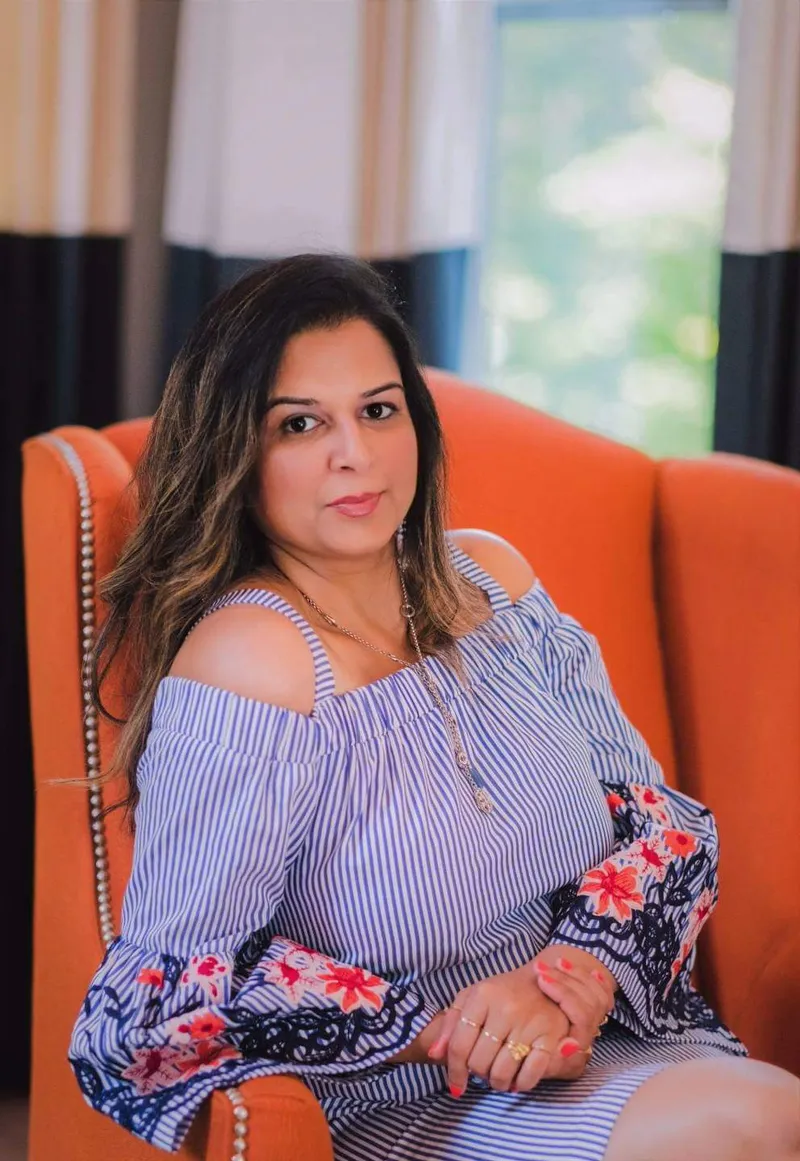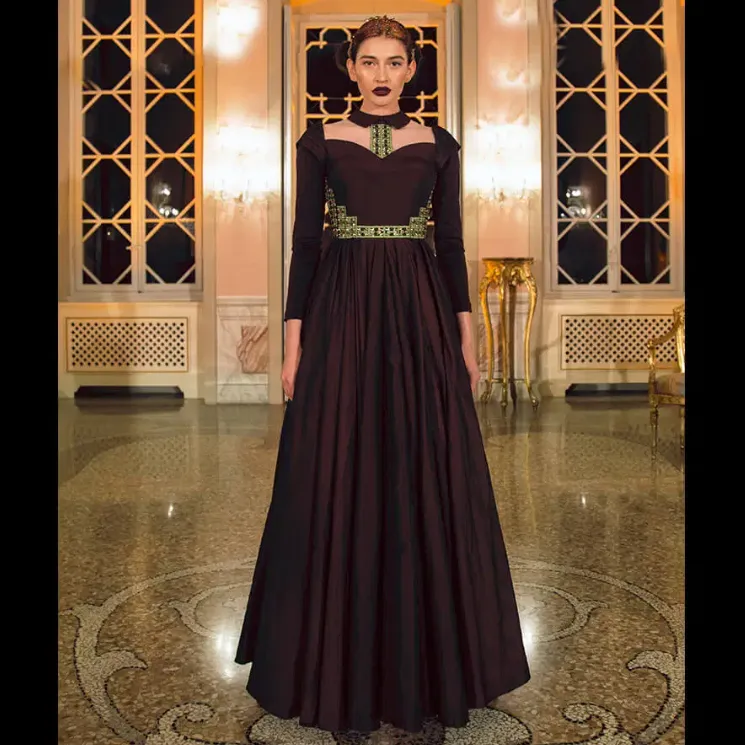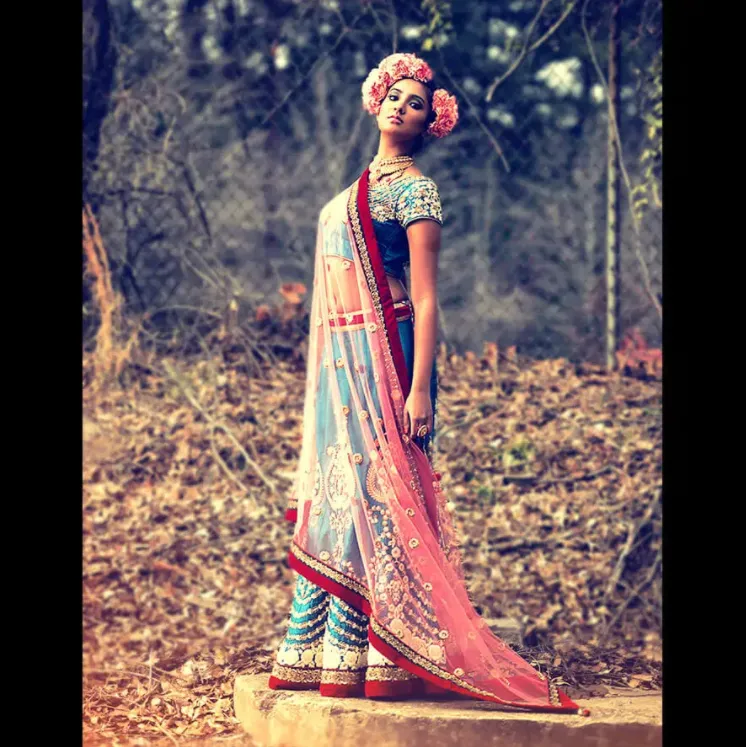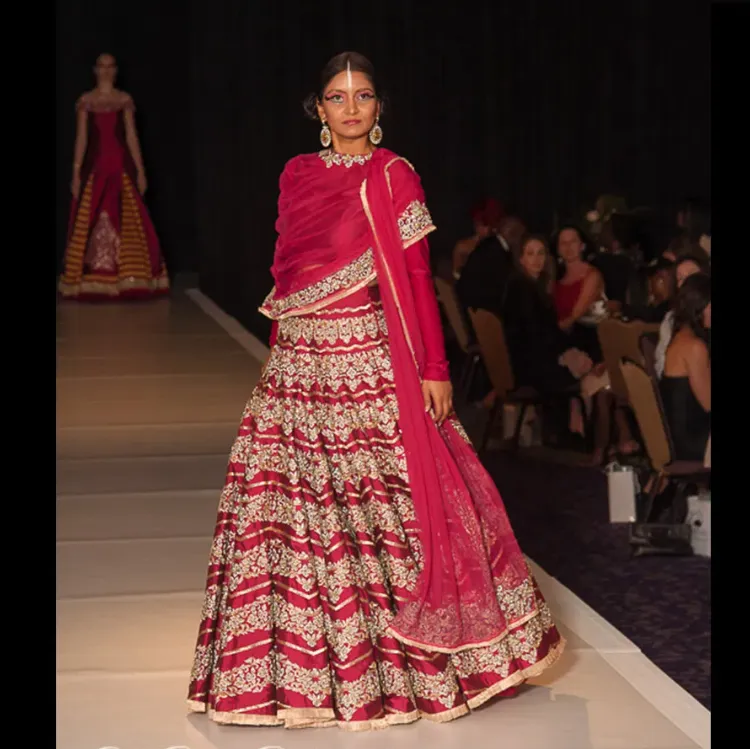This US-based fashion designer quit her corporate job to follow her passion for sustainable fashion
Fashion designer Premal Badiani shares insights on quitting her corporate job to pursue her passion for fashion, starting two labels, and adopting sustainability. She identifies the trends that will make headlines in 2021.
US-based Indian fashion designer Premal Badiani came into the global limelight in 2018 when she honoured breast cancer survivors at the New York Fashion Week Spring/Summer. The Valentia collection, showcased by fighters and survivors of breast cancer, included pieces that were both fashionable and feminine.
“Fashion is a reflection of who you truly are. Fashion gives you the freedom to express yourself in a way you want the world to see you without having to say anything,” Premal tells YS Weekender.

Fashion designer Premal Badiani
Premal is recognised and admired for introducing a 360-degree virtual eco-friendly runaway at the New York Fashion Week. She was also awarded the American Academy Global Award in 2019, and Versatile Designer award by Fortune Magazine, for being a “pioneer in promoting the sustainable fashion in luxury wear.”
Career pivots
Born in London, Premal spent most of her teenage years in India. She moved back to the UK to pursue an MBA in Finance from Middlesex University, London. Premal took the usual route to the corporate world as a banker, and worked as an M&A Consultant for a major financial institution. Always fascinated with creative arts, Premal decided to give fashion a shot.
“As a teenager, I would spend my spare time playing around with various fabrics, colour hues, and distinctive designs...Fashion just crept into my blood, and I listened to my heart,” Premal says.
Premal pursued fashion from the London School of Fashion. However, she did not want to limit her fashion designing skills and passion for the industry to just producing outfits. Premal was determined to use fashion as the means to make a positive impact on society, be an influencer, and give fashion a purpose.
Looking back, Premal has no regrets for taking the corporate route before the entrepreneurial plunge. In fact, she says “I owe a lot to my corporate career where I have learnt the most valuable lessons.”
From understanding time management, dealing with pressure, learning the importance of processes and systems, to valuing one’s resources — are some of the important learnings that Premal took from her corporate life to implement in her entrepreneurial journey. “The two most important things that I have learnt are people management skills and dealing with setbacks which are not always in our control,” she adds.

Designs by Premal
Fashion journey
While still working with corporates, Premal would design outfits for her close friends and family. “I guess my inclination towards designing was almost innate,” she says.
She is now the Creative Director and designer for two brands: Premal Badiani - The Label, and Badiani New York. Primarily based in the US, both brands cater to clients all over the world.
While the former caters to the Indian market, Badiani New York designs for international customers. Through both her labels, Premal targets customers who look for ‘luxuriously fashionable and comfortable’ outfits. Its major markets are the US, the UK, India, and Dubai. Personally, the designer prefers dressing in comfortable yet stylish pieces.

Premal's design from her collection Root Cause
Premal launches approximately three collections every year, with each collection having 12 to 20 pieces and an average of seven styles.
Premal decides on the colours and textures for all her collections herself. “I set myself free and experience new things, absorb, and create. I love travelling and experiencing cultures that have always had a big influence in my work,” she adds. Premal seeks inspiration from textile weaves, paintings, architecture, and even nature.
“I do not compare myself with other designers... I have always aimed to lead a brand that is conscious of its social responsibilities, touches upon the human aspect, and goes beyond just designing clothes,” Premal adds.
Talking trends
Premal says that ‘comfort’ has been the ongoing trend for a while now. “As we gear up for spring and summer, it is only going to continue,” she adds.
According to the designer, wide-leg trousers will be the fashion trend this summer, prints will be in, and “sensual body revealing outfits will make the charts,” she adds. Having said that, Premal emphasises that the major focus of the fashion industry will be on keeping the resources and production local.
She goes on to share tips for women to remain fashionable while adopting a sustainable lifestyle. She says, “Sustainable fashion does not have to be boring; it offers many styles. Whatever may be your style — western or ethnic, there are a lot of trendy and fashion-forward options available.”

Premal's design from her collection Aurorae
Premal suggests that consumers:
- Have an open mind to trying new styles.
- Do not need to change your entire wardrobe at once. Take small steps and make single item choices.
- Have fun exploring the various accessories that compliment your sustainable outfit
- Be confident and take pride in boasting the fact that you are a trendsetter, and that your choice is making a positive global impact.
Fashion for a cause
Over the last couple of years, sustainability has become the talk of the town in the fashion industry across geographies. The threat of climate change is imminent, and one of the major reasons behind it is the way we create and consume fashion.
According to Earth.org, fashion production dries up water sources and pollutes rivers and streams, while 85 percent of all textiles go to dumps each year. Washing clothes releases 500,000 tonnes of microfibers into the ocean each year, the equivalent of 50 billion plastic bottles.
“It is this dynamic of ‘trendy through necessity’ that makes sustainable fashion such an exciting area right now. Adopting sustainable fashion is a lifestyle choice, and we need to realise that caring about the planet is not a seasonal choice but needs to be done all year round. The key is to keep sustainable fashion affordable. Consumption patterns have changed among influencers, who are spreading awareness about sustainable fashion among the masses. Due to these shifts, more people are now willing to make these positive lifestyle choices. One can hope that the era of sustainable fashion will continue to be a major shift in the industry,” Premal says.

Premal's design from Article of Blush collection
Premal actively pursues philanthropic work and has been promoting responsible fashion, and practices life coaching. “Through it (life coaching), I am hoping to make a tangible difference in society,” she says.
Premal is associated with fashion boards of Fashion Group International and IATSE Local 491.
Like everyone else in the creative industry, Premal does face creative blocks. “It is an indication that I need to give my creative cells a rest. I take that opportunity to indulge myself in other pursuits,” she says. Besides being a full-time designer, a Hollywood costume designer, a writer, philanthropist, a certified life coach, and a hands-on mom of twins, Premal serves on the mentor board for fashion institutes as well. “I hardly have a dull moment,” she adds.
Going ahead, Premal plans to establish and grow Badiani New York digitally, as well as locally in the US. Her labels have seen growth not only in the fashion industry, but have also diversified into the film and television industry as Premal has been designing costumes for Hollywood projects. Her plan is to keep growing and become a part of larger projects.
“I believe I am where I am because of my experiences, failures, and triumphs. I am grateful for the journey for it has helped me get a better perspective on things...Sure, there will always be things that I could have done differently but what matters to me the most is what I can do with the lessons learnt and the opportunities that I have at hand,” Premal says.
Edited by Kanishk Singh









![[App Fridays] TikTok lovers, are you ready for Firework, the new short video platform in town?](https://images.yourstory.com/cs/2/a182c7e0140711e987e2f7248b252f46/Firework1571401406063png?mode=crop&crop=faces&ar=1%3A1&format=auto&w=1920&q=75)